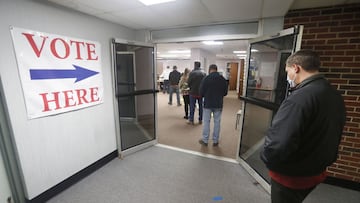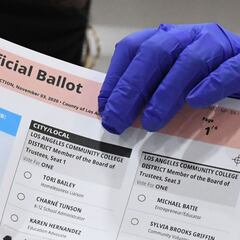USA Election 2020: is it mandatory to vote and can I be fined?
Do you have to vote in the presidential election today, 3 November? What is compulsory voting, which countries enforce it and can you be fined for not casting a ballot?

Today, 3 November, is the presidential election. One often-asked question on election day is whether it is illegal to decide not to cast a vote if you are eligible to do so. The answer is simple: in the US, no one is required by law to vote in any local or presidential election, called mandatory or compulsory voting. The US constitution dictates that voting is a right and a privilege, so to impose mandatory voting would work against this notion.
That means in the US there is no penalty for not voting, nor is there any scrutiny over which citizens decided to exercise their vote and those who decided, for whatever reason, to not cast a vote. Even though it is not mandatory to case a vote, this newspaper would urge you to do so; it's your say in the future of the country. Don't waste it! Even though some people are worried about going out to vote today, with the fear of the coronavirus pandemic very much in the minds of many, the polling stations have taken this into account and will be applying strict hygiene guidelines. So if you want to vote, pop your mask on and get down to cast your ballot.
In America, voter turnout has been increasing steadily for years, with the 2018 midterms reaching the highest in 100 years. However, this high was still only 50%. For presidential elections the turnout is usually just over 60%.
The US has one of the lowest voter turnouts of any developed nation. In recent years experts have floated the idea that #compulsoryvoting could help. I looked into it for @qz, and here’s what I found. 1/7https://t.co/6hD548jArk
— Alex Ossola (@ossolalex) October 22, 2020
You can follow all the latest from the US Elections right here on AS English
Where is voting mandatory?
The 27 nations where it is currently mandatory to vote are Argentina, Australia, Austria (certain regions), Belgium, Bolivia, Bulgaria, Brazil, Democratic Republic of the Congo, Costa Rica, Ecuador, Egypt, Gabon, Greece, Honduras, Lebanon, Liechtenstein, Luxembourg, Mexico, Nauru, Panama, Paraguay, Peru, Singapore, Switzerland (one region), Thailand, Turkey and Uruguay. The other 85% of countries (172) do not have any mandatory voting laws.
There are also examples of countries such as Chile, Cyprus, Italy, the Netherlands and Venezuela which at one time practiced compulsory voting but have since abolished it.
Is mandatory voting a good thing?
Mandatory voting is controversial. Its advocates argue that being forced to vote increases engagement with political issues and intrinsically educates citizens, it also increases the legitimacy of a democracy when all citizens take part.
Critics of a compulsory vote say that it goes against the freedom associated with the very idea of democracy. It's also thought to increase the number of random votes, when apathetic voters check off a name at random (for example the first candidate listed) to avoid being penalised. This phenomenon in itself could damage the legitimacy of a country’s democracy.
How does mandatory voting affect voter turnout?
According to International IDEA, compared to countries that have mandatory voting in force, the turnout in countries without mandatory voting have an average of 7.37% lower voter turnout.
But this seemingly small average masks more extreme differences, for example in Belgium’s 2014 general election where voting is mandatory, turnout was over 87%.In the equivalent US election in 2016, turnout was just shy of 56% of the voting age population, according to Pew Research Center.
New York Times’ Dambisa Moyo thinks that mandatory voting in the US would likely increase turnout among low-income and minority groups.
What happens if you don’t vote in countries where it’s mandatory?
The rules and sanctions on mandatory voting vary wildly between countries. For instance in Paraguay, Peru and Luxembourg, citizens over 70 or 75 can be exempt from mandatory voting. Whereas in Argentina, Brazil and Ecuador voting is optional between the ages of 16 and 18.
Belgium’s mandatory voting system began in 1892, making it the oldest in the world. Non-voters must provide a legitimate reason for their abstention to avoid fines of 30-60 euros, however no one has been fined in Belgium since 2003. Abstaining from the vote in at least four elections within a 15-year period, the non voter is disenfranchised, meaning that their right to vote is removed for 10 years. It may be difficult to get a job in the public sector if you are a non-voter.
In Italy, though technically mandatory voting was abolished in 1993, an innocuous sanction exists where it may be difficult to secure a day care placement for your child or a similar service if you’re a non-voter, but this is not formalised. Until 2000, Greece refused to issue passport, driving licences or occupational licences to non-voters.
Related stories
Bolivia gives voters a card to prove their participation at an election. If voters cannot show this proof of voting card during the three months after the election, they can be prevented from drawing their salary from the bank.
The USA government voting website has plenty more information on the voting system in America.


